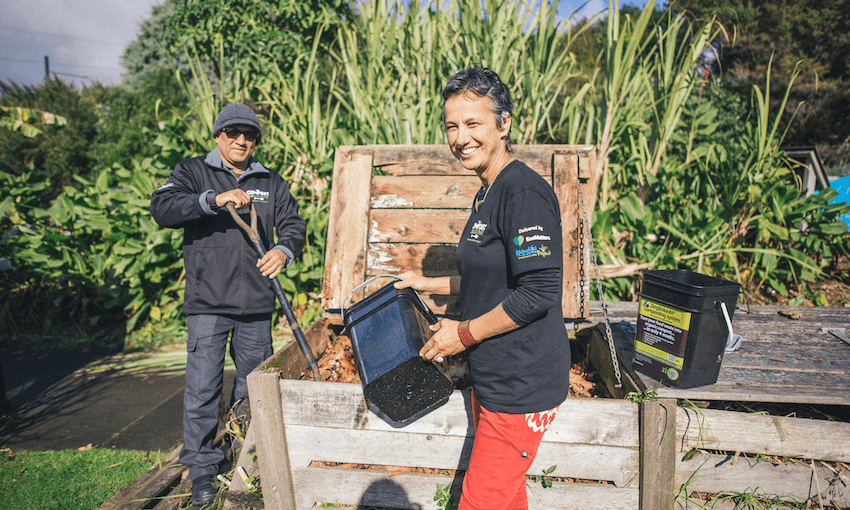Returning nutrients to the soil was once part of every culture, and now, more than ever, it’s time we restore its valuable role in everyday life.
Like keep cups, organic cotton tote bags and eco-friendly cleaning products, composting can at times seem like a new trend latched on to by sustainability-obsessed millennials trying to up their street cred.
It’s not, of course: composting, or the act of putting organic material into soil, dates back to at least the Stone Age, with Scottish farmers improving their small farms with compost as far back as 12,000 years ago.
Composting went on all over the world – in Mesopotamia, Greece, Italy, China, Africa, America, to name a few. For as long as people have been growing food, they’ve been trying to improve the health of the soil with organic matter – it was just what you did. But in modern times, as we’ve become increasingly disconnected from our food, composting has fallen by the wayside.
In the Pacific Islands, says Therese Mangos, who works with Pacific communities as a facilitator for The Compost Collective, a collaborative project supported by Auckland Council, it was always just part of life. “People in the islands didn’t have such a thing called composting because that was done naturally in everyday life,” says Mangos, a Cook Islander. “Because we had pigs, chickens, dogs, and we also tended our plantations. We had more of a mulching culture rather than a composting culture.”
Moving here, those traditional ways are often lost, says Mangos. “Food scraps coming out of the kitchen now, they have this yuck factor, and that has become quite a barrier.”
Getting past that means encouraging people to reconnect with their kai and with growing food as a communal activity. “We grew kai to share among our families and the village, so we’re looking at reconnecting that ‘growing to share’, and use that as a way to connect people back to the need to compost to return nutrients to the soil,” says Mangos.
“These are things that we know, we’ve just lost touch with. We’ve lost sight of what’s valuable. My mission is to reconnect to the values of the life that’s embodied in growing your kai, what you eat, the whole lifestyle.”
Similarly, in traditional Pacific cultures, waste was not a familiar concept. “Waste would never happen – you eat every part of it. Waste is not in any of our Pacific languages – it doesn’t exist because it was never a way of life.”
But today, Aucklanders send 90,000 tonnes of food waste to landfill a year – it makes up around half of what’s in the average rubbish bin. That’s a tragedy, because, as pre-colonisation Pacific cultures knew, food scraps are in fact not waste at all, they’re a valuable resource.
When food scraps are mixed in with other rubbish in landfill, they get buried and rot down without air. Liquid from that rotting waste slowly filters through the landfill, picking up contaminants, and this leachate has to be collected and treated onsite to prevent it from polluting our waterways.
And that’s not the end of it. When food scraps rot in landfill without air, they produce methane, one of the nastiest greenhouse gases. When food waste is composted, on the other hand, and added to soil, the soil’s carbon content increases, making it better able to retain moisture and nutrients. This is called carbon sequestration.
If you glazed over slightly reading those last two paragraphs, that’s understandable. It’s for this reason that Mangos doesn’t focus on the nitty gritty of how composting mitigates climate change in her workshops and advice. Even the Kiribati community, whose low-lying homeland is bearing the brunt of the climate crisis, doesn’t respond well to being lectured about it, says Mangos.
So she instead puts the emphasis on healthy kai. “If we focus on the health side of things, that to me is a message that everyone connects to,” says Mangos. “Healthy planet, healthy people. Our mother earth is in dire straits and in order to restore her, we need to restore the health of ourselves and the soil we grow our food in. Talk about healthy food and that connects us to composting.”
There are more abstract health benefits of composting too, says Mangos – those that relate to mental and emotional wellbeing. “For me, just the daily action of being in the garden gives me such amazing mental release – just connecting to nature on a daily basis.”
In this period of lockdown we’ve found ourselves in, that’s even more important than usual. “What composting leads into is gardening,” says Mangos. “You’re outside taking notice, and it’s the taking notice that has the biggest footprint because you’re understanding time, you’re realising the change of seasons, you’re noticing the birds in the trees… It’s about really connecting with what’s going on.”
You can start today, with a bucket. “Get a bucket, put some holes in the bottom and put your food scraps in. Fill it up with soil, put a plant in and you’re composting in a bucket. There you go, easy,” says Mangos.
“So rather than talking about carbon sequestering and reducing methane,” she adds, “I’m focusing on the health and the wealth by just doing this simple activity that connects people to each other and the environment. It’s a beautiful thing.”

